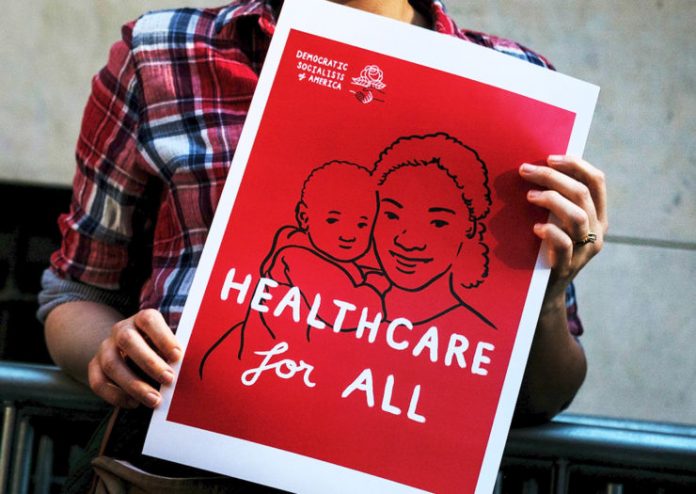According to the Centers for Disease Control (CDC), 133 million Americans have chronic illnesses — diabetes, asthma, HIV, cancer, heart disease, autoimmune diseases. At more than 40 percent of the U.S. population, that’s a huge demographic and expense.
In 2016, the total cost in the U.S. for direct health care treatment for chronic health conditions totaled $1.1 trillion — equivalent to nearly six percent of the nation’s GDP. The most expensive conditions in terms of direct health care costs are cancer, HIV, diabetes, Alzheimer’s and osteoarthritis.
Not included in those costs is another statistic: In 2019, the number of Americans without health insurance has increased by 7 million since President Trump took office. In 2016, the Affordable Care Act (ACA) allowed for the expansion of Medicaid, and the country reached an all-time low of 10.9 percent uninsured. But the U. S. is now at 14 percent uninsured, and that number is expected to tick steadily upward.
When Medicaid was first expanded in 2014 under the ACA, popularly known as Obamacare, the uninsured rate was 18 percent. In just two years, the expansions in 31 states and the District of Columbia, allowed so many more Americans to access coverage.
But when Trump took office, with his push to “repeal and replace Obamacare,” the attacks on the law that had expanded access to so many were felt. In December 2017, the Republican-led Congress enacted the Tax Cuts and Jobs Act of 2017. Embedded in that controversial bill popularly called the GOP Tax Scam was the so-called “skinny repeal” of the ACA. The bill ended the ACA mandate that everyone have insurance or pay a tax penalty.
With the evisceration of the aspect of the law that created a balanced insurance pool of sick and healthy people, premiums skyrocketed, and people could no longer afford their plans. The OMB (Office of Management and Budget) had predicted that the costs would rise exponentially and that sick people would pay the stiffest penalty in exorbitant premiums.
I was one of those people. Diagnosed with breast cancer at 26 and again at 28, I had a pre-existing condition. I also have a disabling, progressive neuromuscular disease, multiple sclerosis (MS), for which there is no cure, but treatment is exorbitant, with medications totaling as much as $70,000 per year.
A month after the GOP tax bill was signed, my insurance premium with Blue Cross skyrocketed to $1,978.10 per month. This was no Cadillac plan — it was just a standard HMO. But I was in a new and deadly demographic — over 55 with pre-existing conditions. My partner was forced to take a second job to help me pay for my medical insurance.
It was a story I heard replicated again and again as I reported on the impact of the new “reforms” Trump had signed into law.
Fast forward to now, and one of the key issues of the 2020 Democratic primary is healthcare. Four candidates — Sen. Bernie Sanders, Sen. Elizabeth Warren, Sen. Kamala Harris and entrepreneur Andrew Yang — support Medicare for All, a universal healthcare plan that would cover every American and give them government-funded healthcare coverage.
None of the other candidates support this plan.
On Nov. 10, former Vice President Joe Biden, whose campaign is headquartered in Philadelphia, one of the most underinsured cities in America, held a town hall on CNN. During the town hall, Biden argued against Medicare for All and railed particularly against Warren, with whom he is tied for frontrunner status in most polls.
But Biden proffered no solutions for America’s uninsured. He argued that Warren’s plan is too expensive, and it may well be. But what are the costs of not insuring 52 million Americans? And Biden does not have a plan to cover everyone.
In the past five years, 34 million Americans — 13 percent — watched someone they knew die because they couldn’t afford medical treatment, according to a poll released Nov. 11 from Gallup and West Health.
More than 20 percent of Black and Latinx people reported knowing someone who died because of unaffordable health care, compared with 10 percent of white people while 19 percent of people with incomes below $40,000 annually knew someone who had died for lack of access to health care, compared with 11 percent of those earning $40,000 to $100,000 and 9 percent of those with an income of more than $100,000.
Money buys access to care.
Two of my past lesbian partners died of late-diagnosed cancer in their 40s. One died of metastatic cervical cancer, the other of metastatic colon cancer. These cancers have two of the highest cure rates due to tests for early detection. But you must have insurance for those pricey tests. Both women were artists working in the gig economy, as I do now and as do 38 percent of Americans. Neither of these women had health insurance. Their deaths were an unnecessary travesty and tragedy that is being replicated all over America.
Every Western country in the world has universal healthcare for its citizens except for the U.S. Yet Americans are sick, disabled and dying — all without access to care. America needs and deserves universal healthcare that covers everyone. Anything less costs us all.
